While the team takes a break over the holidays, we wanted to bring you our annual special edition of the newsletter with book recommendations from our staff and contributing editors.
We wish you a healthy, peaceful and joyful holiday season, and look forward to showing you everything we have in store for the new year.
Bury Me Standing
by Isabel Fonseca
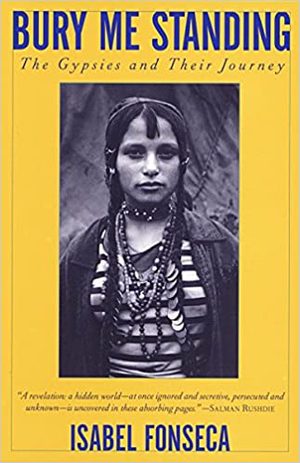
Rasha Al Aqeedi, Middle East Deputy Editor
I read this book for the first time several years ago on the recommendation of one of my intellectual idols, and re-read it again this year while doing research on the Roma people in different parts of the world. “Bury Me Standing” is a prime example of first person reportage and gripping storytelling; two core qualities at New Lines. I recommend the book for anyone looking to understand how cultures and languages can disappear due to oppression, discrimination and marginalization, rather than genocide in its traditional sense. Isabela Fonseca does a masterful job in portraying the Roma people through personal stories, touching on their roots to their current standing in western Europe, not avoiding uncomfortable topics such as child prostitution and the restricted role of women. The book is thought-provoking in the ways it compels the reader to judge other cultures and peoples.
The Anchoress
by Robyn Cadwallader

Amie Ferris-Rotman, Global News Editor
I decided to read this novel after I went on a medieval walking tour in London, where the highlight was a tiny stone enclosure that an anchoress once lived in. I was fascinated: Why would a young woman choose to stay locked up and entirely hidden from the world? Is she avoiding a forced marriage or the dangers of childbirth? Do hermitry and devotion to one’s god bring peace, and can extreme piety eradicate the human need for physical comfort? “The Anchoress,” written by Robyn Cadwallader and published in 2015, is an elegiac novel that sheds light on these questions (in addition to providing rich details, from illuminated manuscripts to descriptions of 13th-century food, that will satisfy the most discerning of historical fiction readers). In the era of Roe v. Wade, the portrait of a woman who exchanges her perceived freedom for safety amid patriarchal tyranny may be exactly what we need.
My Fourth Time, We Drowned
by Sally Hayden
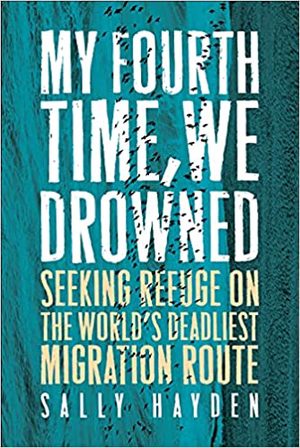
Riada Asimovic Akyol, Strategic Initiatives Editor
The painful themes from this formidable book are skillfully written about by Sally Hayden, an award-winning journalist and photographer who focuses on migration, conflict and humanitarian crises. It is based on her interviews with hundreds of migrants coming from different parts of Africa who have been stuck in Libya’s detention centers, trying to cross the Mediterranean Sea to reach Europe.
The author shares information about migrants’ numerous challenges and dehumanizing experiences that range from very bad to horrible, as well as heartbreaking stories of resilience, love and loss. The book is a meaningful reminder of the consequences of harmful migration policies to all conscientious citizens of the world, and a sobering reminder for journalists and editors like me, about the stories we choose to pay attention to and publish. Another reason why I found the book incredibly moving is because of the author’s truly delicate counsel and an important warning: “How immune have we all grown to the destruction of life and the ongoing failure of humanity when it comes to responding to it?”
Star Dust: Poems
by Frank Bidart
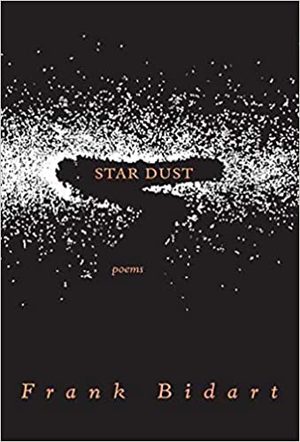
Erin Clare Brown, North Africa Editor
Whenever my life feels on the cusp of transformation, I return to Frank Bidart’s slim volume of elegant verse that I first read as I hurtled full speed toward the cliff of my college graduation 15 years ago. “Star Dust” is a meditation on the urge to create; to make not just one’s own art, but also to make meaning in one’s life. It chips away at the pain of becoming, burrows into failure and plumbs the depths of dissatisfaction, but it does so without any sense of wallowing or pettiness. This year, as I struggled through my first pregnancy and worried how the birth of my daughter would change my family, career and identity as a woman, I found myself memorizing one particular poem from the collection: “Lament for the Makers.”
“Not bird not badger not beaver not bee / Many creatures must / make but only one must seek / within itself what to make,” it posits in its opening salvo. The journey into making — our careers, our families, ourselves, I remind myself — is as much a part of the process as any output that comes afterward.
Jamaica Inn, Daphne du Maurier
by Daphne du Maurier
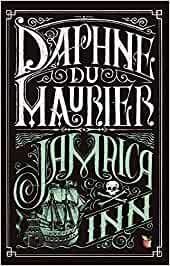
Courtney Dobson, Senior Editor
I read Daphne du Maurier’s “Jamaica Inn” a number of years ago after receiving it as a gift. The novel is a historical mystery that takes place in 19th-century Cornwall, England, and centers on Mary Yellen, a young, single woman who comes to live with her aunt and uncle at Jamaica Inn after her mother’s death.
In a time when women had little freedom or independence, Mary stands out as a determined and independent character, uninterested in the trappings and mundanity of domestic life. All this changes upon arrival at Jamaica Inn, where Mary is confronted with her domineering and abusive uncle and traumatized aunt. Almost immediately, Mary becomes preoccupied with escaping the inn but finds herself alone and uncertain who to trust.
Du Maurier’s novel is simultaneously bleak and gripping. The moors of Cornwall are raw and foreboding and parallel Mary’s vulnerability and sense of being trapped. The scenery and complex characters that du Maurier details have stuck with me. “Jamaica Inn” is the perfect novel to read during the winter when days are short and the weather is harsh; tuck in under a cozy blanket with a cup of tea and lose yourself in the haunting drama where du Maurier sprinkles just enough hope to keep you turning the page.
The Newlyweds: Rearranging Marriage in Modern India
by Mansi Choksi
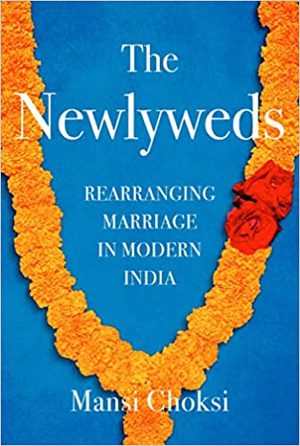
Surbhi Gupta, South Asia Editor
People are often intrigued about how marriages are fixed in India and the boundary lines that surround the practice. A lot of factors must be considered and compatibility is an afterthought: the religion, caste, class, clan of the person, the region they belong to and the language they speak. Same-sex marriages are not yet legal. Marriages are usually arranged by families. Hence, to digress from the norms and choose your own partner often leads to ostracization and, in many cases, honor killing. Kidnapping cases are also filed against the male’s family. This is why love marriages, as they are known in South Asia, where two people in love decide to marry, are an anomaly. In this book, Choksi highlights that fewer than 6% of Indians have chosen partners on their own.
Urban India may claim the country is keeping up with the times. But 95% of the population reside in small towns and villages, where old customs and traditions thrive. In “The Newlyweds,” Choksi follows three such couples. Neetu and Dawinder, hailing from a village in Haryana, cross the lines of caste and elope in the dead of the night. Monica and Arif are a Hindu-Muslim couple in Nagpur, a stronghold of the Hindu right wing. Distant cousins Preeti and Reshma are a same-sex couple in the temple town of Shirdi.
This is not a book of happily-ever-afters. It exposes the struggles and regrets that ensue in such cases. For instance, Neetu and Dawinder must escape the Love Commandos, a voluntary organization that provides shelter but also abuses couples like them. Monica realizes her class difference with Arif and must make peace with the poverty of his family. Reshma and Preeti must deal with the insecurities that shadow relationships.
If you want to understand how honor killing, love jihad and homophobia operate in Indian society, this is the book for you.
Benghazi!
by Ethan Chorin
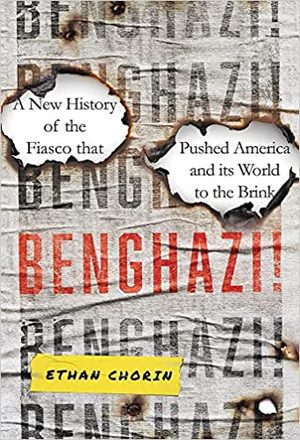
Tam Hussein, Contributing Editor
When I received Ethan Chorin’s book Benghazi! I had expected it to be a great tome on Libya’s recent political history. Chorin is an expert on Libya and a well-known translator of Libyan authors. However, what I got instead was a book on the killing of an American ambassador, Christopher Stevens, on Sept. 11, 2012, in Benghazi and a dissection of its aftermath.
Chorin shows us that, to Americans, this strangely named city in a far-off land served as a perfect canvas for disinformation and division within. It brought to the surface a wellspring of conspiracies built up over decades. The fiasco was peddled mercilessly among the media, politicians and conspiracy theorists. When the book was completed, the U.S. appeared unrecognizable. The Capitol had been taken over and ransacked by Trumpists, five people had died and there stood a bizarre Jamiroquai lookalike complete with horns and tattoos calling himself the QAnon Shaman and howling. You can’t but ask yourself, how did it come to this? Chorin’s book tries to make sense of where the events in Benghazi sit in America’s recent political history and beyond. And what makes it even more personal is that on the day the ambassador was killed by militants, Chorin was due to meet him.
Do Not Disturb
by Michela Wrong
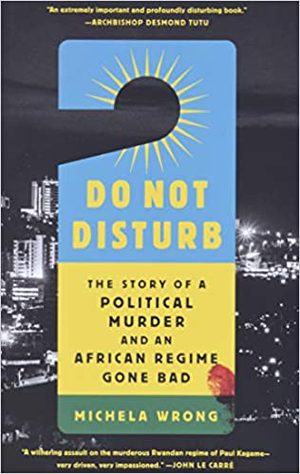
Kwangu Liwewe, Africa Editor
I have long been intrigued by the story of the 1994 genocide in Rwanda and have keenly followed the country’s development after the genocide. I have covered elections, the economic success story, the genocide memorials and the government’s clampdown on dissenting voices. One of those voices was Patrick Karegeya’s who once headed the external intelligence wing of the Rwandan Patriotic Front (RPF) and was a close ally of President Paul Kagame before he fled into exile. Michela’s book is an investigation into Karegeya’s murder in a plush Johannesburg hotel on New Year’s Eve in 2013. She points her finger at Kagame for Karegeya’s death and questions his numerous accolades such as “visionary leader” and “Rwanda’s savior” for ending the genocide and turning the country’s economy around. The book looks into the history of the RPF families, three wars and the genocide.
I would recommend this book to anyone who wants to delve deeper into the narrative that all is well in Rwanda, Africa’s success story, a narrative peddled by some Western leaders. Anyone who wants to understand East Africa’s history in relation to Rwanda should read this, as well as anyone who wants a deep look at Kagame’s biography.
The Children of Ash and Elm: A History of the Vikings
by Neil Price
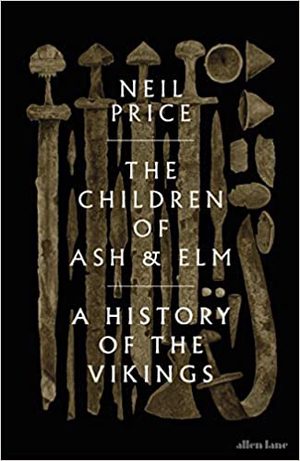
Joshua Martin, Multimedia Producer
Yes, it’s a book about vikings. But don’t expect a book about battles, berserkers and big burly men drinking mead: These are not the vikings you know, and their gods are definitely not played by Chris Hemsworth. The vikings Neil Price introduces you to are heavily tattooed. They file brightly-colored grooves into their teeth. They share their world with all manner of otherworldly beings, including their dead relatives. They practice elaborate rituals of human sacrifice. They have a four-part composite soul.
As is the case with so many pre-Christian European peoples, the vikings wrote very little down, and most of what we know of their beliefs comes from their Christianized descendants. But Price, an archaeologist, has a detective’s knack for putting the details together into a coherent portrait of a people long gone. The result is surprisingly moving — an intimate glimpse into a world that is at once profoundly alien and disarmingly human. And yet “Children of Ash and Elm” really shines where he fails, because in the end it is the gaps which are most compelling — the mysteries that will forever go unsolved and the details that modern eyes can’t make sense of. In a bizarre and vivid description of viking funeral practices, Price mentions that the naked man whose job it was to light the pyre made sure to keep his orifices covered with his hands or pointed away from the fire. Why? What did he think would happen if he didn’t? It’s a frustrating but strangely humbling reminder of just how much can be lost over a thousand years of time.
Kitchen Confidential: Adventures in the Culinary Underbelly
by Anthony Bourdain
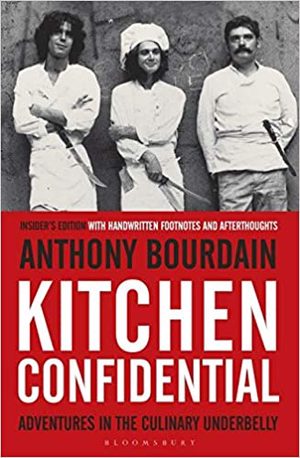
Maysa Mustafa, Audience Editor
This one may be a throwback for most, but it was a new read for me this year. After binge-watching all of “Parts Unknown,” I decided it would be worth my time to read the book that started it all for Bourdain. “Kitchen Confidential” has been a bestseller for more than two decades, so it doesn’t need much of an introduction. But, I will say, as a young journalist living in New York City in her mid-twenties, this was a total reset for me even 22 years after it was published. No, not to cook — because there’s no hope there — but a reminder that there are stories anywhere you are willing to look for them, the best characters are never the obvious ones and to embrace being reckless every now and again.
Camus and Sartre: The Story of a Friendship and the Quarrel That Ended It
by Ronald Aronson

Danny Postel, Politics Editor
This book made an enormous impact on me. It’s simultaneously a work of intellectual storytelling; a compelling portrait of a friendship between two towering literary figures (and its agonizing demise); and a history of the 20th century’s epic political dramas on a microcosmic — and deeply personal — level.
I was already interested in the work of Albert Camus and Jean-Paul Sartre, but the story is so well told and so gripping, the ideas are explained so clearly and the debates are brought to life so vividly, I don’t think any prior knowledge is necessary in order to enjoy and learn from the book. What makes it especially poignant is how the author situates himself in relation to his subjects. The quarrel in the book’s subtitle revolved around two issues: the Cold War (specifically the nature of Soviet communism) and the Algerian War of Independence (1954–1962). Their debates over these momentous questions were complex and multilayered, but as they were unfolding and for many years after, the prevailing sentiment was that one had to side with Sartre and against Camus to be on the right (or actually the left) side of history. And that was decidedly Aronson’s own orientation for much of his life, but as he explains in the book, he eventually came to see the Sartre/Camus split in a different light. He didn’t exactly flip the script and take Camus’ side over Sartre, but rather he came to see more shades of gray and ambiguities in the debate between the two writers than he had previously allowed himself to see. And that self-critical perspective, which informs Aronson’s understanding of the rich drama he recounts (and his protagonists were both dramatists, in addition to being novelists, philosophers and political essayists), makes the book all the more engaging and refreshing.
Beer in the Snooker Club
by Waguih Ghali

Alex Rowell, Online Editor
“Before the revolution you could only pick up a fare in the posh districts,” says the taxi driver to Ram, the young man who has hailed his cab after a day of whisky, bridge and swimming at Cairo’s exclusive Gezira Club. “Now the army people also ride in taxis.”
In two short sentences, Ram’s creator Waguih Ghali — the author of this 1964 novel — speaks volumes about the reality of Egypt under President Gamal Abdel Nasser, where the soldiers who seized power in a coup in 1952 have turned the military establishment into the new ruling class. Such insights are everywhere in this neglected gem of postcolonial literature, which manages in just over 200 pages to combine a love story with an existential bildungsroman, laced with political commentary that now looks, in the wake of the Arab Spring, to have been decades ahead of its time. In exposing the lie at the core of Nasser’s dictatorship — which promised Egyptians liberation but delivered tyranny — the novel anticipates both Naguib Mahfouz’s “Adrift on the Nile” and Sonallah Ibrahim’s “That Smell” by several years (and is far more forthright in its criticism of the regime than either). Amazingly for a novel published three years before the Arabs’ stunning humiliation at Israel’s hands in the Six-Day War, its author was even able to perceive that Egypt’s army was “useless” (in Ram’s word) as a fighting force, seeing straight through the propaganda that fooled almost everyone else at the time.
In the course of several years researching the Nasser period for a forthcoming book, I have read not a few works on the subject, but perhaps none so completely free of illusions about the officers’ republic — nor any that feel so strikingly contemporary six decades after publication. “We have the worst of both systems,” reflects Ram near the novel’s end. “Both the dictatorship and the starvation without any future to look forward to.” Plus ça change.
This Arab Life
by Amal Ghandour
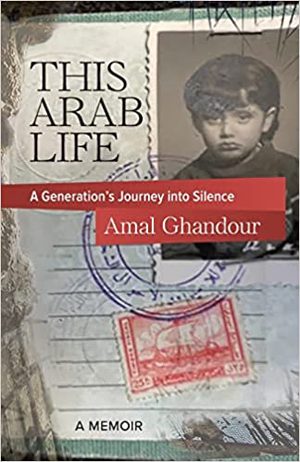
Lydia Wilson, Culture Editor
Published this year, this book manages to combine a close and personal memoir with a description of a huge arc of Arab history. Portraying recent events in the Levant through the lens of her own life, Ghandour shows how a generation acquiesced to the hijacking of their countries, choosing stability in return for their silence.
In some senses, then, this is a “small” book — and it is literally small, coming in at under 160 pages of a slight format — covering family life, childhood fun and adult responsibilities. Yet the scope is as vast as the Arab world itself, taking in social conventions and how they’ve changed, the relationship between ruler and ruled, the different aspects of religion and religiosity, the role and effect of “education,” how the personal and political interact, corruption, education, economics, privilege and poverty.
It is in fact how my favorite essays work, with compelling personal stories interwoven with broader intellectual points, the one illuminating the other to make it more than the sum of its parts, accessible. A gripping read, intriguing for both experts and novices of the Middle East alike.
What Just Happened?!
by Marina Hyde

Faisal Al Yafai, Executive Editor
It’s rare for collected columns to shed more light in aggregate than in elemental form, but Hyde’s collection manages it, if only because, by roaming across six of the most politically contested years in living memory, her writing shows quite how astonishing — she prefers WTF-ery, surely the epithet du jour for the past “années” — they have been.
One of the reasons I like Hyde is that she easily mixes pop culture and politics. It’s something too few writers do, behaving as if there is an iron curtain between the two. But people experience those worlds in tandem, getting their information about both from the same sources — and, crucially, judging the behavior and the norms of both by the same standards.
This Warholian stage — to suddenly become serious in a way Hyde’s writing rarely does — is the reason the antics of Donald Trump both resonated and were excused, because many millions interpreted them through the lens of celebrity culture. But uninformed riffing on world events isn’t funny when accompanied by the power of a state.
Sign up to our mailing list to receive our stories in your inbox.



